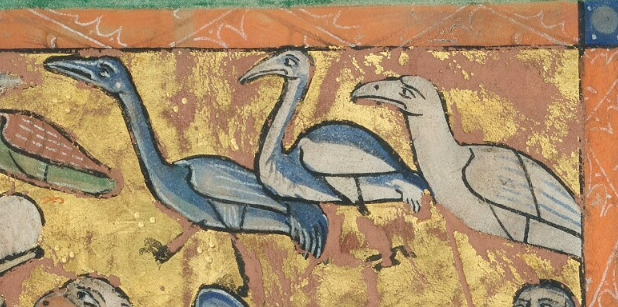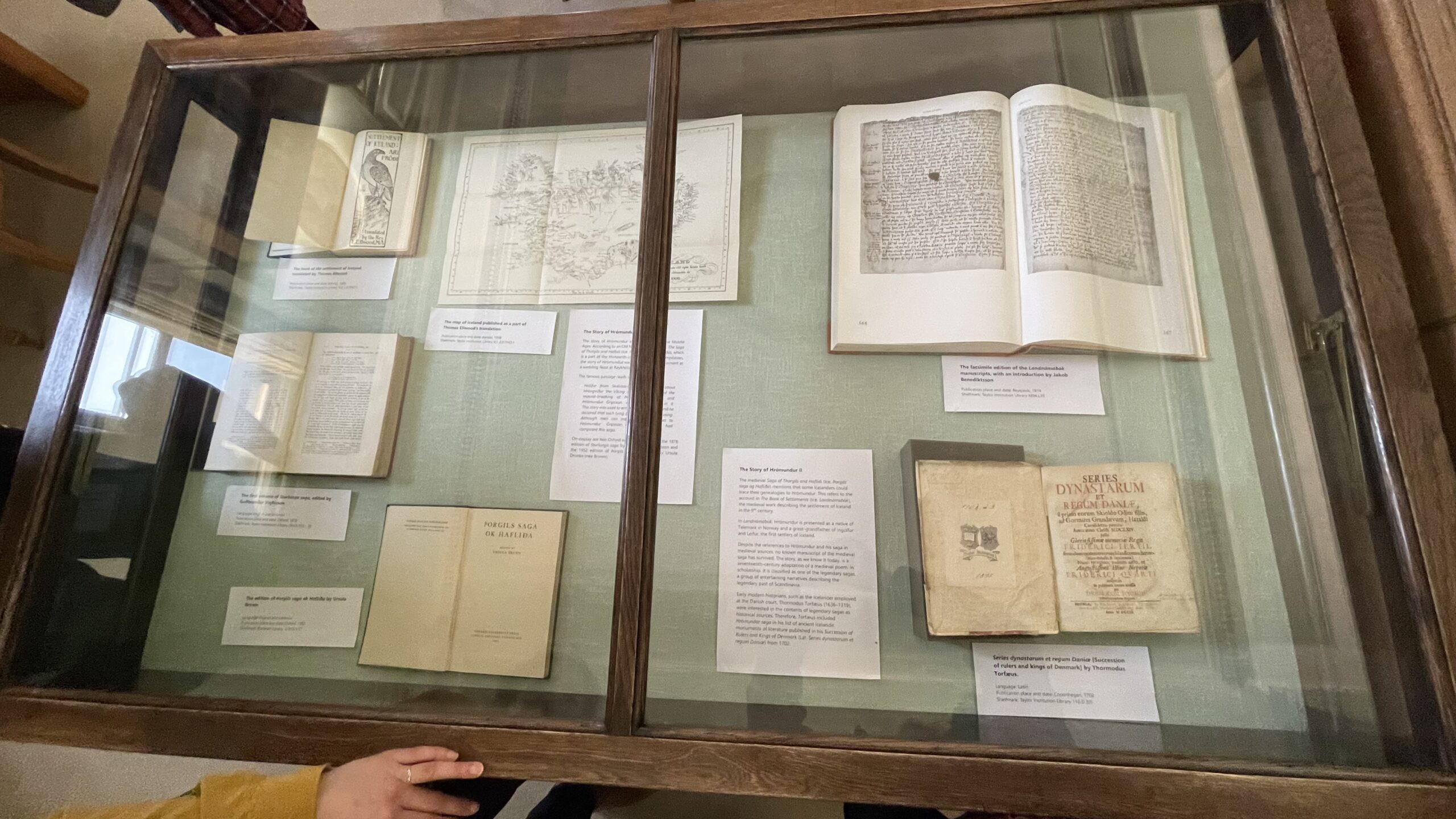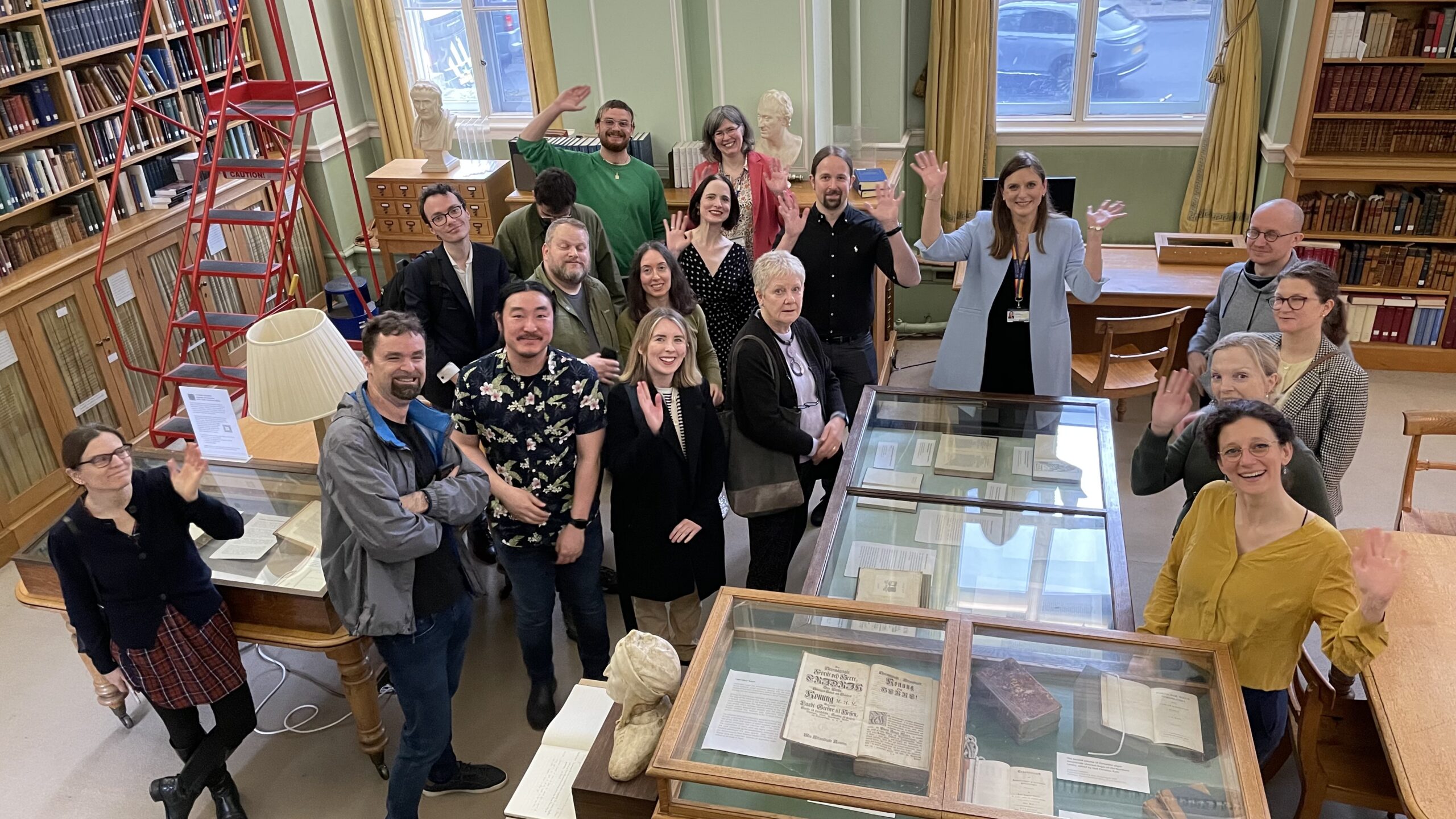As we near the end of the teaching year I am driven to reflect on all of the fantastic things we’ve seen at OMS during the course of the year. I’m always struck by the phenomenal range of our medievalist activities: particularly by the huge number of languages represented! Some wisdom this week, then, on a common medievalist problem: that of translation between languages – taken, as always, from the Epistolae project: :
Scito, filia, quod sententia cujuslibet dicti, si de lingua in linguam translata fuerit, vix in peregrino idiomate, sua ei sapiditas vel compositio remanebit.
[Know, daughter, that the meaning of any saying, if it is translated from one tongue to another, will barely retain its savour or composition in a foreign language.]
A letter from A letter from Adam, abbot of Perseigne to Blanche of Navarre
Luckily for us all, there are ample opportunities to learn new medieval languages or to cement our understanding of existing ones at any number of reading groups! This week we have, for example, opportunities to hear about medieval English, Hebrew, Latin, German, Old Norwegian, and Japanese – and I’m sure, with apologies, that there are further languages that have escaped my immediate notice! Please see below for the weekly roundup, and to take full advantage of this embarrassment of linguistic riches.
As blog posts this week, we have the report and recordings of the workshop on the Reception of the Nibelungenlied and Homer workshop; do go and see the exhibition linked to it in the Voltaire Room of the Taylorian Epic! Homer and the Nibelungenlied in Translation which is only on until Wednesday (continued then for another two weeks on a reduced scale)!
EVENTS THIS WEEK:
Monday 27th May:
- The Queer and Trans Medievalisms Reading Group meets at 3pm in Univ. This informal reading group will explore queer and trans themes in medieval texts. In Trinity, we’ll be thinking about queerness and transness on trial in the Middle Ages. This week’s theme will be The trial of Katherina Hetzeldorfer (Speyer, 1477). All extremely welcome, both in-person and online! To join the mailing list and get texts in advance, or if you have any questions, email Rowan Wilson (rowan.wilson@univ.ox.ac.uk).
- The Tolkien 50th Anniversary Seminar Series meets at 5pm in the Summer Common Room, Magdalen College. This week’s speaker will be David Bernabé (University of Oxford/University of the Basque Country), Riddles in the Grass: the characterisation and narrative value of landscape over the fields of Rohan. For more information, please see https://tolkien50.web.ox.ac.uk/.
- The Medieval History Seminar meets at 5pm in the Old Library, All Souls College and on Teams. The Teams session can be accessed by logging in to Teams with your .ox.ac.uk account and joining the group “Medieval History Research Seminar” (team code rmppucs). Alternatively, you can use this link. If you have any difficulties please email: medhistsem@history.ox.ac.uk. This week’s speaker will be Laure Miolo (Lincoln, Oxford) ‘Establishing a school of astronomy and astrology in the fourteenth century? The case of the universities of Paris and Oxford’.
Tuesday 28th May:
- The Medieval English Research Seminar meets at 12.15pm in Lecture Room 2, English Faculty. This week’s speaker will be Alex Paddock, Keble College, Oxford, Patience, the Middle English Physiologus, and the deep sea of experience. Seminars followed by a sandwich lunch. All welcome!
- The Medieval Poetry Reading Group meets at 4pm in the Colin Matthew Room, Radcliffe Humanities Building. This week’s theme will be Japanese Poetry This is an activity of the TORCH Network Poetry in the Medieval World. For more information, you can refer to our website https://torch.ox.ac.uk/poetry-in-the-medieval-world; you can also contact Ugo Mondini.
- The Medieval Church and Culture Seminar meets at 5.15pm in the Wellbeloved Room, Harris Manchester College. This week’s speakers will be Marion Ryley (Wadham), Envisioning Division: marginal medallions in medieval Judaic and Islamic manuscripts and Maya Smith (St Cross), Using Pigment Analysis of Pre-Conquest Manuscripts to Illuminate Trade and Commerce. Everyone is welcome at this informal and friendly graduate seminar.
- The Oxford Interfaith Forum meets at 6-7pm, online for The Greatest Medieval Masoretic Pentateuch: The Lailashi Codex—the Crown of Georgian Jewry. A Panel of Distinguished Scholars will present the Greatest Medieval Masoretic Pentateuch—The Lailashi Codex: The Crown of Georgian Jewry. To register, please click here: https://us02web.zoom.us/meeting/register/tZ0vfuyppjMpH9UZ-8i1kakoZh0UoGSVPsTl#/registration.
Wednesday 29th May:
- The Medieval German Graduate Seminar meets at 11.15am in Oriel College King Edward Street 7 (Annette Volfing’s office; press the intercom buzzer to be let in). The topic for this term is Konrad von Würzburg: ‘Der Schwanritter’; this week we will discuss human-animal interaction with Philip Flacke presenting. Open access edition here. If you are interested to be added to the teams group for updates, please contact Henrike Lähnemann.
- The Medieval Latin Document Reading Group meets at 4-5pm on Teams. A document is sent out in advance but homework is not expected. Please contact Michael Stansfield for further details and the Teams link.
- Dr Peter Tóth (Cornelia Stark Curator of Greek Collections at the Bodleian Libraries, Oxford) will speak on as term lecture for the Centre for Manuscript and Text Cultures “In Quest of a Medieval Best-Seller: The Authorship of the Meditationes Vitae Christi” 5.15-6.45 Memorial Room: The Queen’s College, Oxford
Thursday 30th May:
- The Environmental History Working Group meets at 12.30-2pm in the Merze Tate Room, History Faculty. This week’s speaker will be Ruka Hussain, “Science, Ecology and Romanticism in George Catlin’s travelling ‘Indian Gallery’”. We try to keep discussions informal, and we encourage anyone at all interested in these kinds of approaches to join our meetings, regardless of research specialism or presumed existing knowledge. For updates on meeting details, refer to the EHWG tab on the Environmental History website. For further information or to join the EHWG mailing list, please email environmentalhistoryworkinggroup-owner@maillist.ox.ac.uk
- The All Souls Seminar in Medieval and Early Modern Science meets at 2-3.30pm in the Hovenden Room, All Souls College. This week’s speaker will be Lawrence Principe (Johns Hopkins University), Franciscan Spirituality, Transmutation, and the Antichrist: John of Rupescissa’s Alchemical Thought and Practices.
- The Germanic Reading Group meets at 4pm online. Please contact Howard Jones Howard.Jones@sbs.ox.ac.uk to request the handouts and to be added to the list. This week will be on Old Norwegian (Nelson leading).
- The Medieval Visual Culture Seminar meets at 5pm at St Catherine’s College, Oxford, Arumugam Building. All welcome! This week’s speaker will be Gervase Rosser, University of Oxford, ‘Irrational, Feminine, Subversive: The Cult of Miraculous Images in Medieval England’.
Friday 31st May:
- The Medieval Coffee Morning meets as usual 10:30am in the Visiting Scholars Centre of the Weston Library (instructions how to find it) with presentation of items from the special collections, coffee and the chance to see the view from the 5th floor terrace.
- Workshop: Binding the world, withholding life. Poetry Books in the Medieval Mediterranean takes place at 10 am at Exeter College, FitzHugh Auditorium, Walton St, Oxford OX1 2HG and online. Register via Eventbrite for online attendance. Online registration closes 2 hours before the start of the event. You will be sent the joining link within 24 hours of the event, 2 hours before and once again 15 minutes before the event starts. The full programme will be shared after registration and on https://torch.ox.ac.uk/event/binding-the-world-withholding-life.-poetry-books-in-the-medieval-mediterranean.
OPPORTUNITIES:
- Assistant Professor of Early Medieval History [Temporary Cover]: The University of Cambridge Faculty of History wishes to recruit a Temporary Assistant Professor in Medieval History. This is a 2 year Temporary Assistant Professorship to cover the the absence of Professor Caroline Goodson, while she is seconded to the American Academy in Rome. The role will include teaching and examining at both undergraduate and postgraduate levels across a range of early medieval European topics; expertise relating to the medieval Mediterranean may be an advantage. For full details, please click here.
- College Lectureship in Medieval History (part-time): St. Peter’s College invites applications for a one-year, 7-hour College Lectureship in Medieval History for one year from 1 October 2024, to provide teaching during Prof Stephen Baxter’s sabbatical leave. The position will be particularly suitable for either a doctoral research student nearing the completion of their thesis, or an early career scholar, seeking experience in college teaching and administration. For full details, please click here.
- Transcription Opportunity: Katherine Turley requires a transcription of a fairly short item in English, in Oxford, Queens College MS 357 (fols. 83v–88v). If you are interested in undertaking this work (obviously for payment) please contact Katherine directly.
Finally, learning languages is all well and good, but of course the real joy (if I may be so bold to suggest, as a literature scholar…) comes in being able to use them for reading. So here is some wisdom on the joys of reading:
Ille liber mihi gratus erat, gratissima dicta.
Ergo consumpsi saepe legendo diem.
[That book was welcome to me, the words most welcome,
So I spent the day reading them often.]
A poem to Baudri from Constance of Le Ronceray
I hope that however you are spending this bank holiday Monday, you are able to enjoy welcome words, and to spend a day reading things that bring you delight!

St John’s College MS. 61, f. 64 v.
By permission of the President and Fellows of St John’s College, Oxford
Viewable in full at Digital Bodleian

























